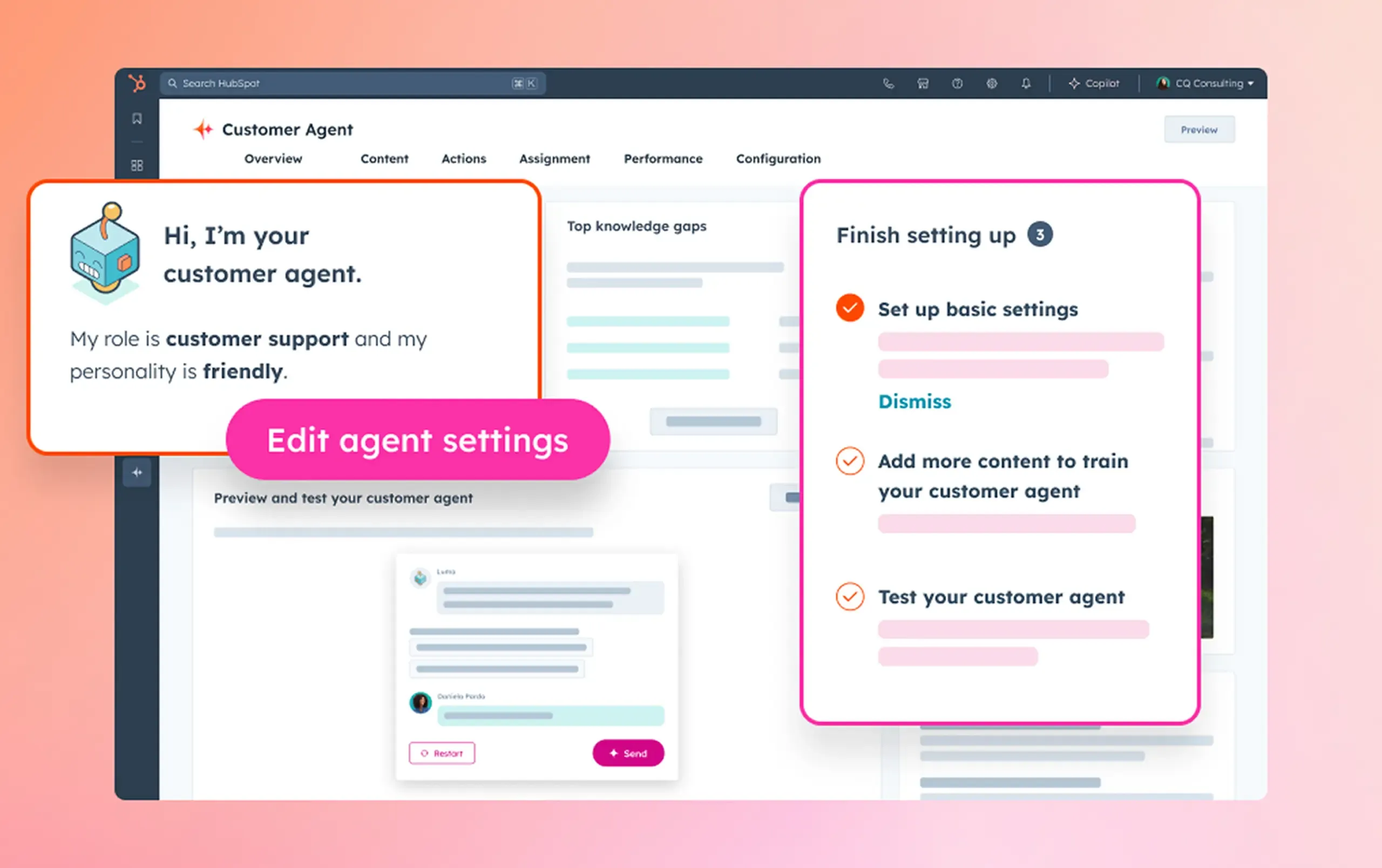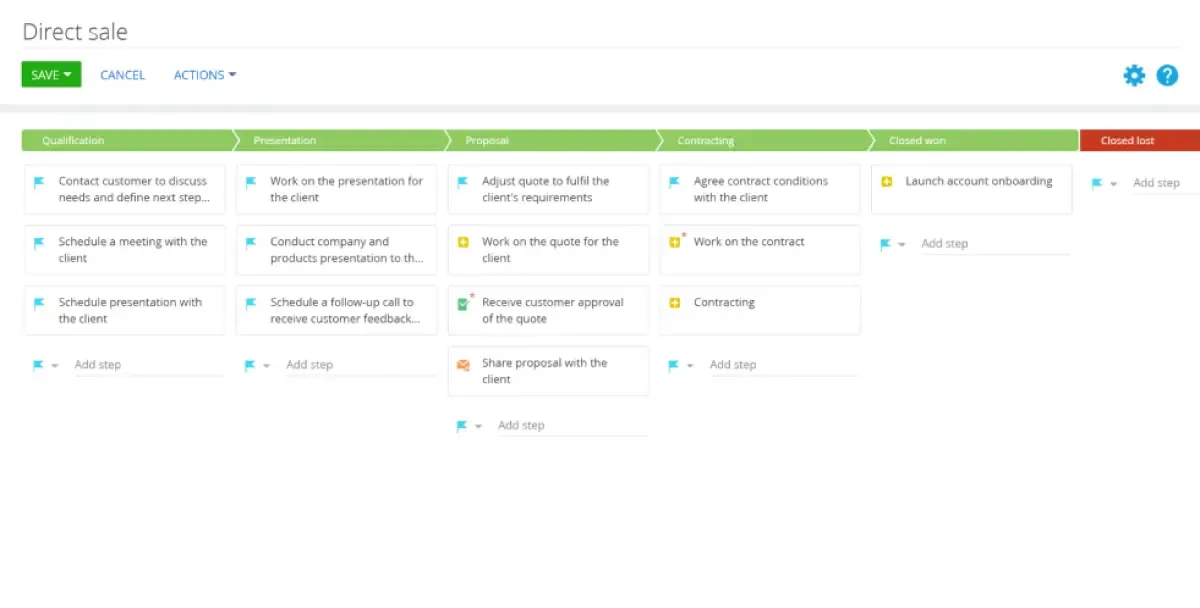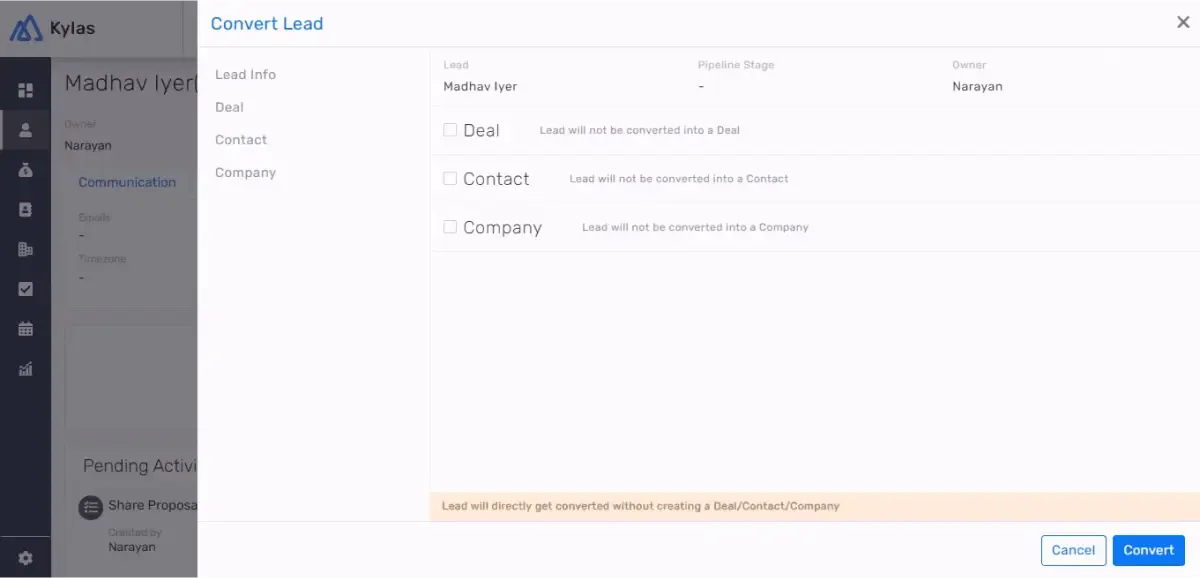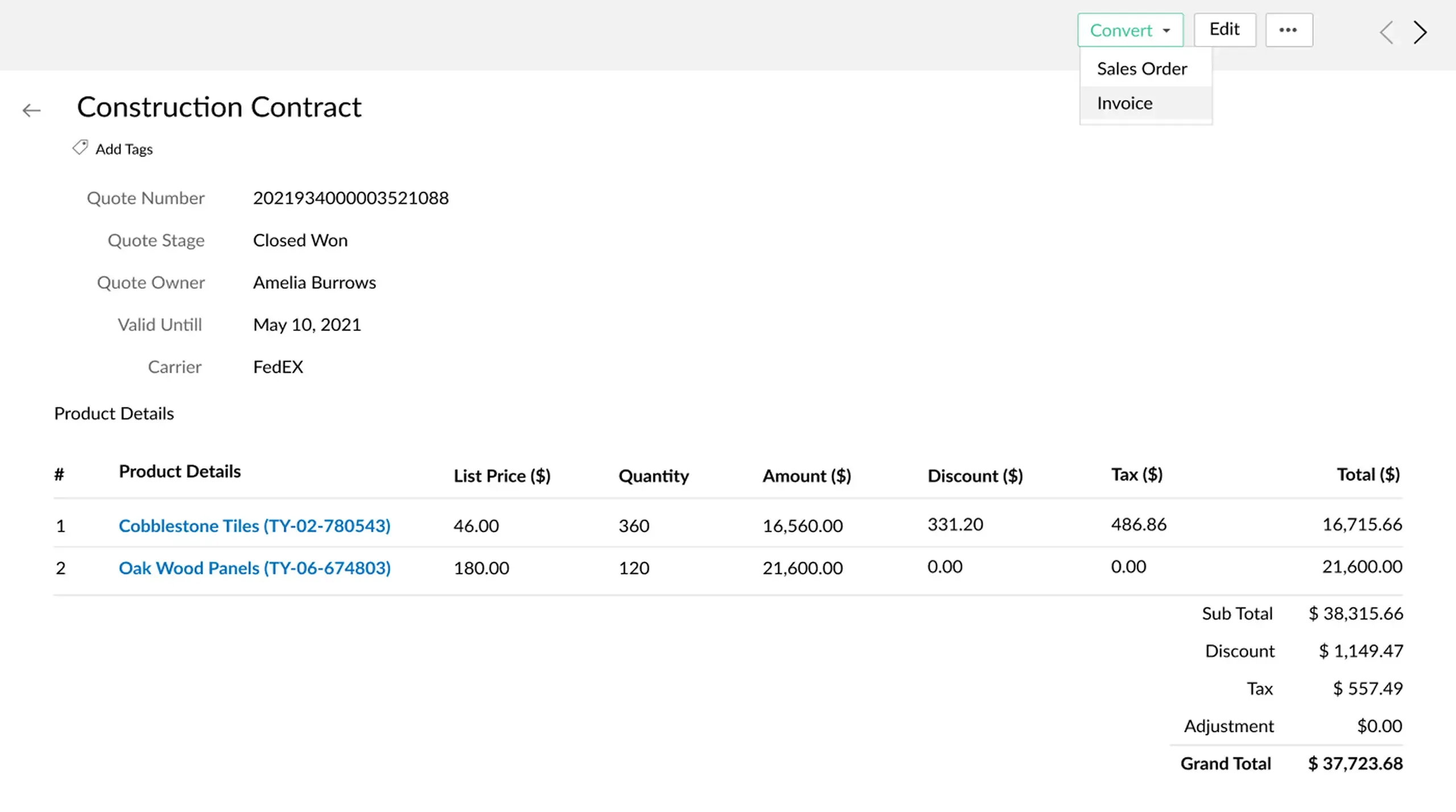Services
SERVICES
SOLUTIONS
TECHNOLOGIES
Industries
Insights
TRENDING TOPICS
INDUSTRY-RELATED TOPICS
OUR EXPERTS

July 8, 2025
Streamline lead generation and nurturing and ultimately increase conversion rates.
Get a 360-degree view of customers and business partners to facilitate engagement and foster collaboration.
Ensure sales pipeline visibility, boost coordination among sales team members, and increase lead conversion, cross-selling, and upselling.
Speed up order fulfillment and monitor inventory levels to prevent stockouts or overstocking.
Serve customers anytime, anywhere, speed up case resolution, and thus maximize customer retention and lifetime value.
Optimize your customer relationship management strategies and enable data-driven decision-making.
Manufacturing companies requiring a new CRM system can build a custom CRM solution or select one of the off-the-shelf platforms, typically SaaS solutions available on the market. Here are some of the best CRM platforms in terms of market presence and user satisfaction according to the G2 Grid.
As the most popular CRM software provider on the market, Salesforce delivers the broadest set of manufacturing-oriented capabilities for customer relationship management. Its Customer 360 suite includes Manufacturing Cloud, a CRM solution that extends the platform’s generic functionality for sales and customer service with industry-specific capabilities. While Manufacturing Cloud doesn’t provide marketing-oriented features, Salesforce adopters can additionally adopt Marketing Cloud, one of the core products of the platform.

Dynamics 365 is an extensive software suite encompassing CRM products for marketing, sales, and service management, along with broader ERP functionality like finance and accounting, HR, and supply chain management.

Odoo is a comprehensive platform with multiple independent modules combining CRM and ERP capabilities, including specialized features for lean manufacturing. Unlike other competitors, Odoo provides both an open-source (Odoo Community) and a licensed (Odoo Enterprise) version.

HubSpot is a popular CRM platform that includes multiple software products or “Hubs” addressing key aspects of customer relationship management, such as sales, service marketing, and content creation. Recent updates have also included new agentic AI functionality to automate various CRM operations.

Image title: HubSpot’s Customer Agent setup
Image source: HubSpot
Creatio’s offering encompasses three CRM products (Marketing, Sales, and Service Creatio) featuring out-of-the-box workflows for manufacturing and other verticals, along with a no-code development platform (Studio Creatio) to build applications, integrations, and automated workflows. These tools can be purchased separately or adopted as a unified solution.

Image title: Creatio’s sales pipeline management dashboard
Image source: creatio.com — Accelerate your sales and rev up your customer relationships with Zoho CRM
Kylas is a user-friendly, fairly priced CRM solution that focuses on sales pipeline management and automation but complements these capabilities with manufacturing-oriented features like warranty management and supply chain tracking.

Image title: Kylas’ lead conversion dashboard
Image source: kylas.io
Zoho’s extensive service offering includes a CRM solution, multiple applications covering key ERP capabilities like finance and HR, and over 1,000 out-of-the-box integrations. Manufacturers can also rely on this platform’s no-code application builder, namely Zoho Creator, to develop custom tools addressing their industry-specific needs.

Image title: Zoho’s invoice generation feature
Image source: Zoho
Prioritize CRM products with off-the-shelf manufacturing-specific features covering most of your functional requirements, since customizations can fill some gaps but can be pricey or limited by the provider. Additionally, look for a solution that integrates seamlessly with the products and services you currently use to create a more synergistic software ecosystem.
If you can’t find a CRM product aligned with your unique needs but your company isn't ready to invest in custom CRM, opt for a solution with extensive configuration options (such as configurable fields) and customization capabilities (including low-code/no-code tools to create custom workflows).
Despite the growing popularity of cloud deployment, many CRM platforms like Dynamics 365 also offer an on-premises option. Thus, select a cloud-based solution to benefit from superior scalability, maintenance provided by the vendor, and lower costs for hardware, but opt for on-premises systems if you’re searching for greater control over features, upgrades, and security.
Consider implementing a CRM solution enabling access from mobile devices, possibly via a dedicated mobile app. This can be particularly useful for sales representatives, field service specialists, and other professionals operating on the go.
Make sure to select a CRM product equipped with robust cybersecurity features (for instance, identity and access management or security information and event management) and designed in full compliance with industry regulations.
Ask vendors for detailed quotes, compare their pricing models (per-user, flat-fee, tiered by feature set, etc.), and be aware of contract clauses that can entail additional costs for premium plans.
Ask your business partners using the products you’re interested in if they’re satisfied with them. Peer-to-peer review sites like G2, Gartner, or Capterra can also help in this regard, providing a score and a summary of each CRM platform’s pros and cons based on user feedback.
Several vendors offer free trial periods to test their CRM platforms. Assemble a team of specialists from relevant departments, including marketing, sales, and customer service, to leverage this opportunity and gather feedback.
with a unified, easily accessible storage to consolidate customer-related data from other corporate systems and third-party services, enabling manufacturers to contextualize and personalize interactions with clients and optimize workflows
through the automation of time-consuming tasks like marketing content generation, prospect and task assignment to sales teams, quote and invoice generation, and order processing, which results in minimized manual efforts and shorter sales cycles
thanks to capabilities for lead generation (including lead segmentation, personalized marketing, and omnichannel communication) and conversion (such as lead scoring and automated engagement actions), which enable manufacturers to close deals easier and faster
by delivering personalized buyer's journeys (including tailored offers and communications) and providing more effective customer support to timely address warranty claims, order delays, and other cases
through supply chain management capabilities for easier procurement and distribution, self-service portals for information sharing and communication, and rebate programs to reward distributors and dealers
Itransition helps manufacturers build and implement industry-specific solutions tailored to their unique business processes and customer base.

Unlike companies in other sectors that interface with end customers, manufacturers often interact with their clients indirectly, mediated by other supply chain players like distributors and retailers. Furthermore, manufacturing businesses can serve completely different types of clients and therefore act as vendors for consumers for some organizations or as suppliers for others. This adds a layer of complexity to customer relationship management in manufacturing.
CRM systems can help overcome these challenges, enabling manufacturers to improve coordination with supply chain partners and differentiate their product and service offerings to meet the expectations of existing or potential customers more efficiently. Consider relying on an expert partner like Itransition to implement the right CRM solution for your needs.
Popular manufacturing CRM integration options for creating a highly synergistic technology environment include:
ERP software
to harmonize customer-related operations with manufacturing processes and other key corporate workflows (such
as coordinating order management and production management)
Marketing automation software
to target specific leads and customers with automated, fully personalized ads and messages based on personal
data stored in your CRM
Accounting software
to fill in purchase orders, invoices, and contracts with customer data, track invoice statuses, and create
financial reports based on sales orders
HR platform
to track sales managers’ KPIs according to their sales performance and customer feedback
Order management and inventory management software
to access more advanced capabilities for product and asset tracking, real-time stock level monitoring, and
omnichannel fulfillment
Project management software
to help project managers establish project timelines and deliverables based on customer information and requirements
recorded in the CRM
A platform-based CRM system is usually the best option for manufacturers who prioritize faster implementation and aim to minimize initial investments and maintenance efforts. Furthermore, adopters will typically benefit from regular updates included in the subscription, built-in security mechanisms, and a wide range of out-of-the-box integrations.
That said, some companies may require very specific functionality tailored to their unique needs, or simply prefer to have full control over their own CRM and avoid recurring licensing fees. In that case, a bespoke solution built from the ground up will likely represent a more viable alternative.
The budget can differ significantly between custom and platform-based CRM. The investment for platform-based solutions usually starts at $10,000 for entry-level options, but you should be ready to incur recurring fees based on the plan selected. As for custom systems, you can expect to spend anywhere from $90,000 (for a basic tool meeting the needs of small businesses) to $300,000+ (for enterprise-oriented solutions).

Insights
Explore the core functionality, benefits, and challenges of ERP for manufacturing, along with adoption guidelines and top platforms available on the market.

Insights
Discover distinctive elements, key features, and benefits of enterprise CRM software, along with top platforms and criteria for choosing the most suitable one.

Service
Itransition delivers scalable software to help manufacturers automate business processes, optimize manufacturing operations, and improve decision-making.

Insights
Hire a certified Salesforce services provider with 10-year expertise in Salesforce CRM and other solutions to carry out seamless adoption and transformation.

Case study
Read the story behind Itransition’s 5-year collaboration with a leading UK furniture manufacturer on web, mobile and VR solutions.

Insights
Learn how machine learning can help manufacturers to improve operational efficiency, discover real-life examples, and learn when and how to implement it.
Platforms
Industries
Insights